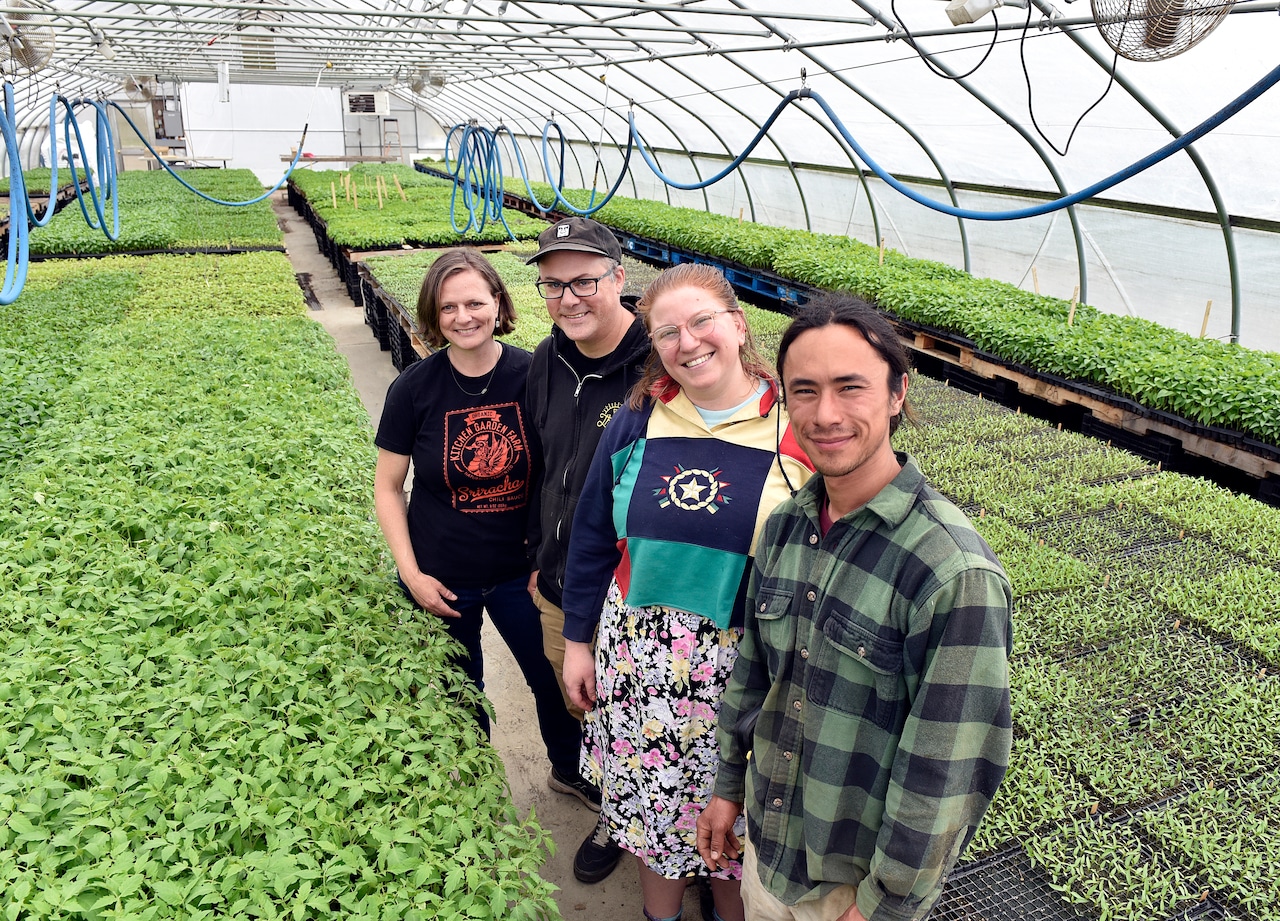
SUNDERLAND — Tim Wilcox and Caroline Pam are handing over the reins of their Kitchen Garden Farm to a pair of longtime employees in the coming days. It is a transition of ownership based as much on trust as on a transfer of cash.
“They’re people we have worked alongside very closely for many years,” said Pam. “We have witnessed their good judgment and strong commitment to doing an excellent job producing high-quality vegetables and managing the land, but also managing the team well and earning their respect.”
Lilly Israel and Max Traunstein have run harvesting, production and sales at Kitchen Garden vegetable farm for nearly two decades and are in line to become new co-owners of the farm by the end of May.
Keeping farms in the family is a generational tradition in New England, but after owning the business for 18 years, Wilcox and Pam are not transferring it to their children, who are teenagers. The couple is turning control over to people they consider stewards of the land.
This arrangement is so important to Wilcox and Pam, they’re giving the new owners special financing.
The purchase price is 20% less than the actual value of the business, allowing the new owners to avoid using personal finances to make a 20% down payment. Israel and Traunstein will rely only on revenue generated by the two million dollar a year business to make loan payments.
“We wouldn’t be able to purchase the farm if it wasn’t for the deal we are getting,” said Israel.
The parties worked with the United States Department of Agriculture and bankers to hammer out the arrangement.
“Starting a new farm as a young person is really difficult, and transitioning out of farm ownership is as well. This financial arrangement can be a blueprint for other farmers interested in making a succession plan with their employees, or other people in their lives,” continued Israel.
Wilcox and Pam took various paths in life, which eventually converged on their way to farming as a couple.
Pam studied English literature, graduated from the University of Chicago and worked as a journalist for a newspaper in New York and a food magazine in Europe. There was also a stint on a farm in Italy.
Wilcox graduated from Hampshire College in Amherst after studying agriculture, sociology and anthropology. He worked at a farmers’ market in New York. Pam worked there too, and that’s where they met.
“We have a deep interest in food culturally, cooking it and talking about it. Farming is a creative expression of that interest and a way to connect with people. Over time, it became a business, but it started out just as a creative exploration,” said Pam.
Kitchen Garden Farm is a 65-acre mosaic of land made up of 14 different parcels scattered throughout Sunderland and Whatley. The couple and their employees grow 50 varieties of vegetables, but no fruit — and there is no livestock. They wholesale their produce to other farms, restaurants and retailers. They also sell sriracha and salsa made from ingredients grown on the farm.
Kitchen Garden is a strictly organic farm — they don’t use chemical fertilizers or pesticides. Because there are so many plots, there is a crop rotation plan that calls for some acreage to be used while the rest remains fallow. Rotating crops ensures healthy soil and prevents harmful insets from destroying plants.
“With plants rotating every year, pests don’t have a chance to establish themselves. If there’s not a host plant they’re attracted to, the insects won’t be around,” said Pam.
Kitchen Garden’s strategy of working a number of plots has also proven to be an effective diversification program, giving them a buffer against climate change.
“In any given year, if we get a lot of rain, the drier fields will perform better. If we have drought, the less well drained fields might perform better. It’s a contingency to have different microclimates and qualities,” said Pam.
At the height of the growing and harvesting seasons, there are as many as 25 people on the farm. While the workload can be enormous, with long and busy days, noon to 1 p.m. is sacred—it is a time for the entire staff to have lunch together. One of them makes the meal, using ingredients harvested from their land.
“We have a really good culture. People are friends, and we lunch together every day. That’s a really big part of the job,” said Traunstein.
Eager to help lead the farm into the future, Traunstein is hands-on in the dirt, working land he will soon call his own.
“The thing that drew me to this is I have a spirited kind of energy, and I just have always appreciated how tactile the work is and how real it feels. We have a solid community here. People have a strong sense of connection to each other. It’s the exact opposite of working at a desk,” he said.
Pam said retiring from the business and turning the farm over to new leadership won’t be bittersweet, because she plans to stay on as a consultant if the new owners need her. While she and her husband stand ready to help, she’s eager to see what Israel and Traunstein can accomplish on their own.
“I’m excited to see how they navigate decisions they’ll need to make,” she said. “It feels like an exciting chapter and I know we’ve left it in really capable hands.”




